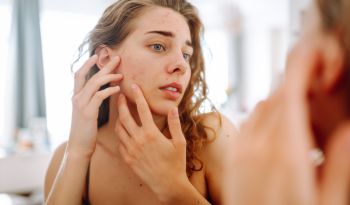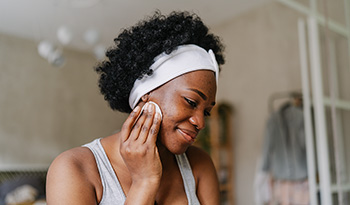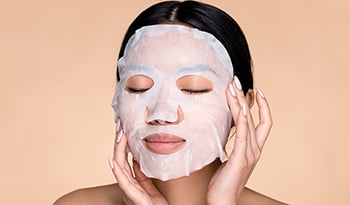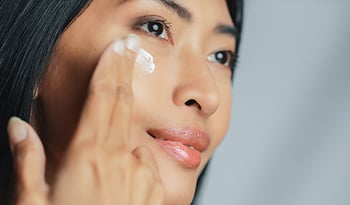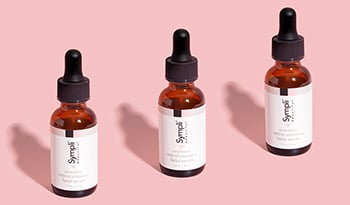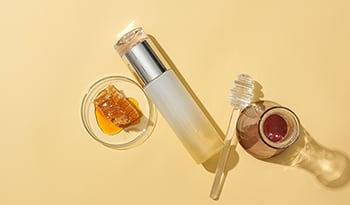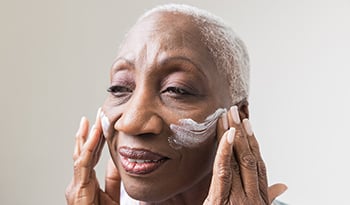Psychodermatologia: Dlaczego naukowcy uważają, że połączenie umysłu ze skórą ma znaczenie?
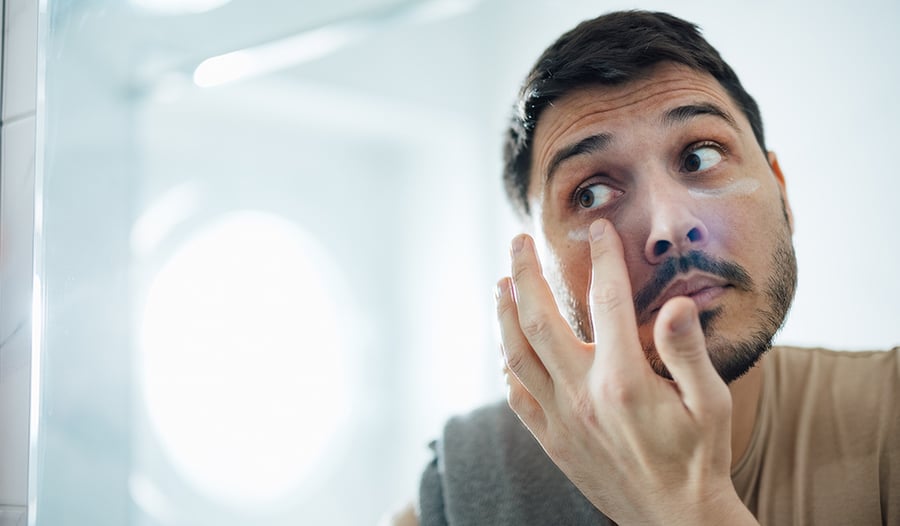
Większość ludzi słyszała o połączeniu jelita-mózg, w którym jelita i mózg komunikują się ze sobą. W rzeczywistości połączenie jelita-mózg zostało dobrze potwierdzone w wielu badaniach od dziesięcioleci. Ale co z połączeniem umysł-skóra?
Czy psychodermatologia może być kluczem do zrozumienia skomplikowanej interakcji między emocjami a naskórkiem? Czym jest psychodermatologia i w jaki sposób ta rozwijająca się dziedzina może zmienić zasady gry w odniesieniu do zdrowia skóry?
Czym jest psychodermatologia?
Psychodermatologia to wyłaniająca się dziedzina, która przecina się z badaniem skóry i umysłu. Łączy dermatologię, która obejmuje zrozumienie i leczenie chorób skóry, takich jak bielactwo nabyte, trądzik i trądzik różowaty, z psychologią i psychiatrią, które starają się zrozumieć umysł i jego zaburzenia, takie jak depresja, lęk i schizofrenia, a także wiele innych.
Pomimo poglądu, że psychodermatologia jest nową i rozwijającą się dyscypliną medycyny, po raz pierwszy wspomniano o niej w starożytnej Grecji w czasach Hipokratesa. W swoich dziełach Hipokrates potwierdził związek między stresem a skórą. Wspomniał nawet o przypadkach, w których ludzie wyrywali sobie włosy z powodu stresu emocjonalnego.
W nowszych czasach, książka Diseases of the Skin, napisana przez Williama Jamesa Eramusa Wilsona w latach pięćdziesiątych XIX wieku, przedstawiła światu bardziej dogłębne spojrzenie na psychodermatologię. Wilson pisał o "nerwicy skóry". Nerwica skóry jest technicznie definiowana jako stan wpływający na skórę spowodowany zaburzeniem psychicznym bez przyczyny organicznej.
Wilson zauważył, że zaburzenia psychiczne były powiązane z takimi chorobami skóry jak zmiany skórne, które miały jaśniejszy kolor niż otaczająca je skóra; łysienie plackowate lub plamy wypadania włosów powodujące łysienie; a nawet urojenia pasożytów w skórze, powodujące swędzenie. Powiązał nawet nadpotliwość, stan, w którym występuje nadmierne pocenie się, z takimi zaburzeniami psychicznymi, jak niepokój, lęki i fobie oraz depresja.
W dzisiejszych czasach psychodermatologia została powiązana z inną rozwijającą się dziedziną, psychoneuroimmunologią, która bada, w jaki sposób zaburzenia emocjonalne i psychiczne, takie jak stres, mogą wpływać na układ odpornościowy i skórę.
Wielu badaczy i klinicystów dzieli zaburzenia psychodermatologiczne na trzy kategorie: zaburzenia psychofizjologiczne, pierwotne zaburzenia psychiczne i wtórne zaburzenia psychiczne.
Zaburzenia psychofizjologiczne to zaburzenia skóry, które reagują na warunki emocjonalne, takie jak stres. Choroby skóry należące do tej kategorii obejmują egzemę i łuszczycę.
Pierwotne zaburzenia psychiczne to stany umysłu, które prowadzą do samoistnych zaburzeń skórnych. Obejmuje to stany takie jak trichotillomania. Trichotillomania to stan polegający na wyrywaniu włosów z różnych części ciała, takich jak skóra głowy lub rzęsy, z powodu silnego stresu lub innych zaburzeń psychicznych.
Wtórne zaburzenia psychiczne obejmują zaburzenia skóry, które powodują oszpecenie i skutkują fobiami społecznymi i niską samooceną.
Oczywiście istnieje dobrze udokumentowana historia zaburzeń psychiatrycznych i psychologicznych objawiających się na skórze i odwrotnie. Sugeruje to, że istnieje wyraźne połączenie między umysłem a skórą.
Rozpakowywanie połączenia umysł-skóra
Podczas gdy połączenie jelita-mózg było szeroko badane i cieszyło się dużym zainteresowaniem w ostatnich latach, mniej mówi się o połączeniu umysł-skóra. W rzeczywistości przekonanie, że ciało jest wzajemnie połączone, dopiero zaczyna zyskiwać akceptację we współczesnej medycynie.
Wzajemne powiązania oznaczają, że żadna część ciała nie działa ani nie cierpi w oderwaniu od innej. Jeśli jedna część ciała jest niezrównoważona, może to również wpłynąć na inną część ciała. Oznacza to, że brak równowagi w mikrobiomie jelitowym może wpływać na zdrowie mózgu, a zaburzenia psychiczne, takie jak lęk, mogą wpływać na integralność i zdrowie skóry.
Ale dlaczego istnieje związek między umysłem a skórą? Psychodermatologia daje nam pewien wgląd w tę kwestię.
Psychodermatologia uznaje, że zarówno skóra, jak i układ nerwowy, w tym mózg, pochodzą z tego samego źródła. Podczas embrionalnego lub wczesnego etapu rozwoju człowieka, warstwa zarodka zwana ektodermą ostatecznie daje początek zarówno skórze, jak i układowi nerwowemu. Ten wspólny związek między pochodzeniem skóry i układu nerwowego pomaga wyjaśnić powiązanie umysłu i skóry.
Badania wskazują również, że fizjologiczne połączenie między umysłem a skórą może wynikać ze specjalnego rodzaju komórek zwanych komórkami Merkela. Komórki Merkela to wyspecjalizowane komórki znajdujące się pod zewnętrzną warstwą skóry (naskórkiem). Komórki te są odpowiedzialne za odczuwanie dotyku i są ściśle powiązane z nerwami, które przekazują wrażenia dotykowe do mózgu.
Komórki Merkela mogą być również zaangażowane w uwalnianie neuroprzekaźników lub przekaźników chemicznych do organizmu. Jedno z badań in vitro (w probówce) wykazało, że rozmiar komórek Merkela w skórze zwiększa się wraz ze stanem zapalnym skóry.
Psychodermatologia daje również lepszy wgląd w związek między umysłem a skórą, badając wpływ stresu na organizm. Jedno z badań wykazało, że ostry stres emocjonalny może prowadzić do zwiększenia aktywacji i degranulacji komórek tucznych. Komórki tuczne to białe krwinki, które zawierają histaminę. Kiedy są aktywowane, uwalniają granulki histaminy (degranulacja) do krwi, powodując zwiększone swędzenie i obrzęk skóry.
Badania nadal wskazują, że istnieje bardzo wyraźne połączenie między umysłem a skórą. W rzeczywistości badania wskazują, że zaburzenia psychiczne są dość powszechne u osób cierpiących na choroby skóry. Na przykład jedno z badań wykazało, że dzieci z egzemą miały znacznie wyższe ryzyko rozwoju zespołu nadpobudliwości psychoruchowej z deficytem uwagi niż dzieci bez egzemy.
Inne badanie wykazało, że osoby z wrażliwą skórą miały większy związek z lękiem i zwiększonym zaczerwienieniem skóry. Jeszcze inne badanie wykazało, że osoby cierpiące na poważne zaburzenia depresyjne były o 64% bardziej narażone na bielactwo, chorobę skóry polegającą na utracie koloru skóry w postaci plam. Badania powiązały również bielactwo z lękiem. Na przykład około 36% osób, u których zdiagnozowano bielactwo nabyte, miało również stany lękowe.
Nawet trądzik został powiązany ze stresem emocjonalnym w psychodermatologii. Badania sugerują, że wzrost stresu może prowadzić do poważniejszych zmian trądzikowych. Jedno z badań przeprowadzonych na studentkach medycyny wykazało, że większe odczuwanie stresu prowadziło do bardziej nasilonego trądziku.
NAC, witamina B i korzyści ze stresu
Badania wskazują, że do 40% osób, które szukają leczenia schorzeń skórnych, cierpi również na zaburzenia psychiczne, które przyczyniają się do pogorszenia ich stanu skóry. Dlatego psychodermatologia koncentruje się na leczeniu zarówno umysłu, jak i skóry, z korzyścią dla jednostki.
Badania w dziedzinie psychodermatologii koncentrowały się na wielu różnych metodach mających na celu poprawę zarówno stanu skóry, jak i zdrowia psychicznego danej osoby. Niektóre z badanych metod obejmują N-acetylocysteina (NAC) , inozytol i witamina B12 . , inozytol, techniki redukcji stresu i witaminę B12 .
Na przykład badania sugerują, że podawanie NAC może korzystnie wpływać na powtarzające się zachowania, takie jak kompulsywne drapanie skóry lub wyrywanie włosów. Jedno podwójnie zaślepione badanie kontrolowane placebo z udziałem 50 osób z trichotillomanią wykazało, że NAC znacząco zmniejszyła nasilenie wyrywania włosów w porównaniu z placebo.
N-acetylocysteina (NAC) jest syntetyczną formą aminokwasu cysteiny, która jest potrzebna do produkcji białek, takich jak beta-keratyna, która znajduje się we włosach i skórze. Studium przypadku obejmujące stosowanie NAC u kobiety z trichotillomanią wykazało, że była ona w stanie całkowicie odrosnąć włosy w ciągu 3 miesięcy suplementacji.
W innym badaniu dotyczącym łuszczenia się skóry, zaburzenia, które powoduje nadmierne skubanie skóry, stwierdzono, że inozytol pomógł zmniejszyć nasilenie łuszczenia się skóry. Inozytol to rodzaj cukru występującego w organizmie i mózgu, który pomaga wpływać na nastrój i funkcjonowanie mózgu.
Badania sugerują również, że zmniejszenie niepokoju może pomóc w bezpośredniej poprawie zdrowia skóry. Badania wskazują, że terapie umysł-ciało, takie jak medytacja i redukcja stresu oparta na uważności, pomogły umiarkowanie poprawić uczucie swędzenia i chęć drapania się u dorosłych z egzemą i łuszczycą w porównaniu z grupą placebo.
Badania sugerują również, że stosowanie witaminy B12 jako suplementu miejscowo lub doustnie może odgrywać korzystną rolę w połączeniu umysł-skóra. Na przykład w jednym randomizowanym badaniu z podwójnie ślepą próbą, kontrolowanym placebo, stosowano miejscowo witaminę B12 na zmiany wypryskowe u dzieci. Badanie wykazało, że miejscowo stosowana witamina B12 była lepsza od placebo pod względem poprawy egzemy po 4 tygodniach obserwacji. Inne studium przypadku wykazało, że suplementacja B12 pomogła poprawić egzemę u 18-letniego mężczyzny, który wymagał znacznych ilości miejscowego leczenia sterydami ze względu na ciężkość jego stanu.
Co ciekawe, badania powiązały witaminy z grupy B, zwłaszcza witaminę B6 i B12, z pozytywnym wzrostem ogólnego nastroju i zmniejszeniem odczuwania stresu.
Na wynos
Psychodermatologia to rozwijająca się nauka oparta na wzajemnych powiązaniach umysłu i skóry. Podejście do połączenia umysłu i skóry z wykorzystaniem psychodermatologii może być drogą przyszłości do promowania zdrowej, młodo wyglądającej skóry i zdrowego umysłu. Badanie psychodermatologii może nawet promować długowieczność, koncentrując się na skórnych przejawach zdrowia psychicznego jako wczesnej oznaki reakcji organizmu na stres.
Dzięki uwzględnieniu wpływu umysłu na skórę i odwrotnie, podejście psychodermatologiczne może być kluczem do kompletnej rutyny przeciwstarzeniowej zarówno dla umysłu, jak i skóry.
Referencje:
- Arck PC, Slominski A, Theoharides TC, et al. Neuroimmunologia stresu: skóra w centrum uwagi. J Invest Dermatol. 2006;126:1697-1704
- Boulais N, Pereira U, Lebonvallet N, et al. Komórki Merkela jako przypuszczalne komórki regulatorowe w chorobach skóry: badanie in vitro. PLoS One. 2009;4(8):e6528. Opublikowano 2009 sierpnia 11. doi:10.1371/journal.pone.0006528
- Chesini Ms D, Caminati Md M. Witamina B12 i atopowe zapalenie skóry: czy suplementacja doustna ma znaczenie terapeutyczne? J Diet Suppl. 2022;19(2):238-242. doi:10.1080/19390211.2020.1860180
- França K, Chacon A, Ledon J, Savas J, Nouri K. Pyschodermatology: a trip through history. An Bras Dermatol. 2013;88(5):842-843. doi:10.1590/abd1806-4841.20132059
- Gieler U, Gieler T, Peters EMJ, Linder D. Skóra i psychosomatyka - psychodermatologia dzisiaj. J Dtsch Dermatol Ges. 2020;18(11):1280-1298. doi:10.1111/ddg.14328
- Graubard R, Perez-Sanchez A, Katta R. Stres i skóra: przegląd terapii umysł-ciało jako strategii leczenia w dermatologii. Dermatol Pract Concept. 2021;11(4):e2021091. Opublikowano 2021 września 1. doi:10.5826/dpc.1104a91
- Jafferany M. Psychodermatologia: przewodnik do zrozumienia powszechnych zaburzeń psychiczno-skórnych. Prim Care Companion J Clin Psychiatry. 2007;9(3):203-213. doi:10.4088/pcc.v09n0306.
- Jović A, Marinović B, Kostović K, Čeović R, Basta-Juzbašić A, Bukvić Mokos Z. Wpływ stresu psychologicznego na trądzik. Acta Dermatovenerol Croat. 2017;25(2):1133-1141.
- Koo J, Lebwohl A. Psychodermatologia: połączenie umysłu i skóry. Am Fam Physician. 2001;64(11):1873-1878.
- Kussainova A, Kassym L, Akhmetova A, et al. Bielactwo i lęk: przegląd systematyczny i metaanaliza. PLoS One. 2020;15(11):e0241445. Opublikowano 2020 Nov 10. doi:10.1371/journal.pone.0241445
- Lochner C, Roos A, Stein DJ. Zaburzenie ekskorupcji (skubania skóry): systematyczny przegląd opcji leczenia. Neuropsychiatr Dis Treat. 2017;13:1867-1872. Opublikowano 2017 Jul 14. doi:10.2147/NDT.S121138
- Manav V, Karaali MG, Erdem O, Koku Aksu AE. Związek między właściwościami biofizycznymi a lękiem u pacjentów z wrażliwą skórą. Skin Res Technol. 2022;28(4):556-563. doi:10.1111/srt.13156
- Nwankwo CO, Jafferany M. N-acetylocysteina w zaburzeniach psychodermatologicznych. Dermatol Ther. 2019;32(5):e13073. doi:10.1111/dth.13073
- Rodriguez-Cerdeira, C. Psychodermatologia: przeszłość, teraźniejszość i przyszłość. Open Dermatol J. 2011;5(1):21-27. doi:10.2174/1874372201105010021
- Januchowski R. Ocena miejscowego stosowania witaminy B(12) w leczeniu wyprysku u dzieci. J Altern Complement Med. 2009;15(4):387-389. doi:10.1089/acm.2008.0497
- Torales J, Barrios I, Villalba J. Alternatywne terapie zaburzeń łuszczenia (skubania skóry): krótka aktualizacja. Adv Mind Body Med. 2017;31(1):10-13.
- Vallerand IA, Lewinson RT, Parsons LM, et al. Bielactwo i duże zaburzenia depresyjne: dwukierunkowe populacyjne badanie kohortowe. J Am Acad Dermatol. 2019;80(5):1371-1379. doi:10.1016/j.jaad.2018.11.047
- Yaghmaie P, Koudelka CW, Simpson EL. Współwystępowanie zaburzeń psychicznych u pacjentów z atopowym zapaleniem skóry. J Allergy Clin Immunol. 2013;131(2):428-433. doi:10.1016/j.jaci.2012.10.041
- Young LM, Pipingas A, White DJ, Gauci S, Scholey A. Systematyczny przegląd i metaanaliza suplementacji witamin z grupy B na objawy depresji, lęku i stresu: wpływ na osoby zdrowe i "zagrożone". Nutrients. 2019;11(9):2232. Opublikowano 2019 wrz 16. doi:10.3390/nu11092232
- Zari S, Alrahmani D. Związek między stresem a trądzikiem wśród studentek medycyny w Jeddah w Arabii Saudyjskiej. Clin Cosmet Investig Dermatol. 2017;10:503-506. Opublikowano 2017 grudzień 5. doi:10.2147/CCID.S148499
- Zhu Z, Yang Z, Wang C, Liu H. Ocena skuteczności suplementów witaminowych w leczeniu egzemy: przegląd systematyczny i metaanaliza. Evid Based Complement Alternat Med. 2019;2019:6956034. Opublikowano 2019 Oct 31. doi:10.1155/2019/6956034
WYŁĄCZENIE ODPOWIEDZIALNOŚCI:Celem niniejszej Strefy Zdrowia nie jest stawianie diagnoz...

















































































 Spis treści
Spis treści



